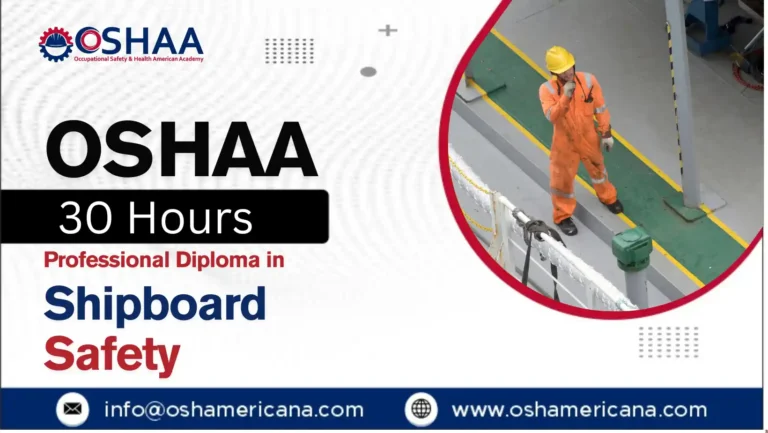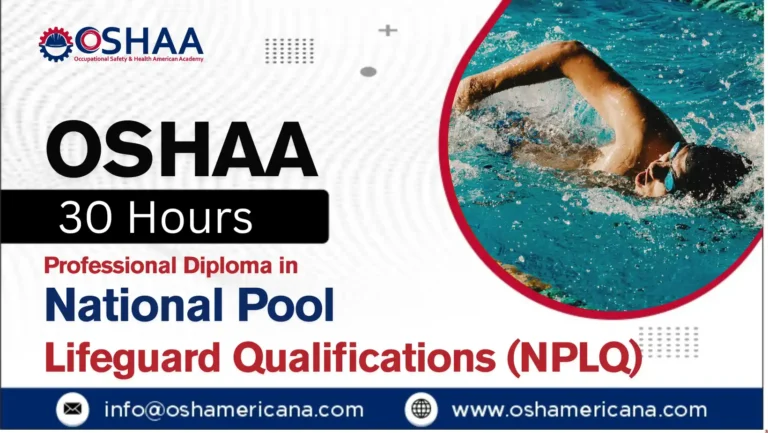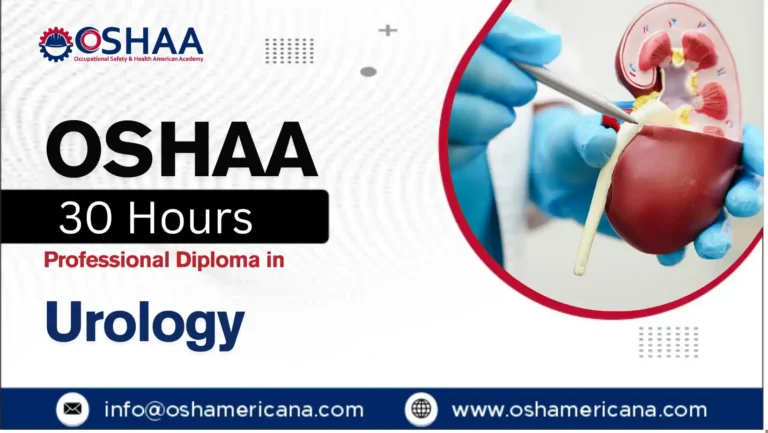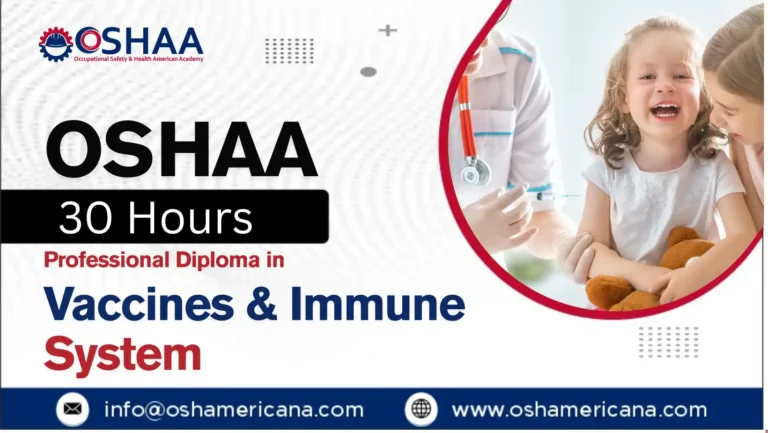Accidents and emergencies can happen anywhere, at any time. Having the right skills to provide immediate assistance can make a critical difference in saving lives and preventing serious injuries. The OSHAA 30-Hours Diploma in First Aid and Safety is designed to equip individuals with essential first aid knowledge, life-saving techniques, and safety practices applicable in both workplace and everyday settings.
First aid is a crucial skill that ensures prompt and effective response during medical emergencies. Whether in a professional environment, at home, or in public spaces, having trained individuals can significantly improve survival rates and reduce the severity of injuries. This diploma provides a comprehensive understanding of first aid procedures, risk assessment, and accident prevention strategies, ensuring participants are well-prepared to handle a variety of emergency situations.
The OSHAA 30-Hours Diploma in First Aid and Safety is a valuable qualification for anyone seeking to enhance their emergency response capabilities. With a strong focus on practical skills and safety awareness, this course empowers participants to take swift and effective action during medical crises, ultimately saving lives and promoting a safer environment for all.
OSHAA 30-Hours Diploma in First Aid and Safety
Study Units
Learning Outcomes
Introduction to First Aid and Emergency Response (3 Hours)
- Understand the fundamental principles and objectives of first aid.
- Identify the responsibilities of a first aider in various emergency situations.
- Learn the legal and ethical considerations in providing first aid.
- Develop skills to assess emergency scenarios and determine appropriate responses.
Basic Life Support (BLS) and CPR Techniques (4 Hours)
- Learn the essential steps of Basic Life Support (BLS).
- Perform effective Cardiopulmonary Resuscitation (CPR) on adults, children, and infants.
- Understand how to use an Automated External Defibrillator (AED).
- Recognise and respond to choking emergencies using the Heimlich manoeuvre.
Handling Common Medical Emergencies (4 Hours)
- Identify symptoms and provide first aid for shock, fainting, and dehydration.
- Manage allergic reactions and anaphylaxis with appropriate interventions.
- Learn how to assist individuals experiencing asthma attacks or breathing difficulties.
- Understand how to provide initial care for poisoning and drug overdose cases.
Wound Care, Bleeding Control, and Bandaging Techniques (6 Hours)
- Identify different types of wounds and their severity.
- Learn proper techniques for cleaning and dressing wounds.
- Apply effective bleeding control methods, including pressure application and elevation.
- Master various bandaging techniques for different body parts and injuries.
Managing Burns, Fractures, and Musculoskeletal Injuries (4 Hours)
- Classify different degrees of burns and their appropriate treatment.
- Provide first aid for fractures, sprains, and dislocations.
- Understand the principles of immobilisation and splinting.
- Recognise the signs of spinal and head injuries and provide basic care.
Recognising and Responding to Cardiac and Respiratory Emergencies (3 Hours)
- Identify the symptoms of heart attacks and strokes.
- Provide immediate first aid response for suspected cardiac arrest.
- Understand the causes and treatment of respiratory distress.
- Learn how to position and assist individuals experiencing breathing difficulties.
First Aid for Seizures, Strokes, and Diabetic Emergencies (3 Hours)
- Recognise different types of seizures and their causes.
- Learn how to provide safe assistance to individuals during a seizure.
- Identify symptoms of hypoglycaemia and hyperglycaemia and offer first aid support.
- Understand how to manage stroke victims until professional help arrives.
Workplace Safety and Risk Assessment (3 Hours)
- Understand workplace hazards and common causes of accidents.
- Learn how to conduct effective risk assessments and implement safety measures.
- Develop skills to prevent injuries and promote a safe work environment.
- Understand employer and employee responsibilities regarding workplace health and safety regulations.
- Life-Saving Skills
Gain essential first aid knowledge and practical skills to respond effectively to medical emergencies, potentially saving lives. - Enhanced Workplace Safety
Understand risk assessment, hazard prevention, and emergency response to create a safer working environment. - Increased Confidence in Emergencies
Develop the ability to stay calm and take appropriate action during critical situations such as cardiac arrest, choking, or severe injuries. - Improved Employability
Strengthen your professional profile with an accredited certification, making you a valuable asset in various industries, including healthcare, education, security, and corporate settings. - Comprehensive First Aid Training
Learn a wide range of first aid techniques, including CPR, wound care, burn management, and fracture immobilisation. - Legal and Ethical Knowledge
Gain an understanding of first aid responsibilities, workplace health and safety regulations, and legal considerations in providing emergency care. - Better Preparedness for Home and Community Emergencies
Ensure the safety of family, friends, and the wider community by being prepared to handle common injuries and health emergencies. - Recognised Certification
Receive a professional diploma demonstrating competency in first aid and safety, meeting regulatory and employer requirements. - Reduced Workplace Injuries and Illnesses
Learn how to implement preventive measures that minimise accidents and health risks in professional settings. - Contribution to Public Safety
Play an active role in promoting health and well-being by ensuring a quick and efficient response in emergency situations.
The OSHAA 30-Hours Diploma in First Aid and Safety is designed for individuals from various backgrounds who want to develop essential life-saving skills and enhance safety awareness. This course is ideal for:
- Workplace Professionals and Safety Officers – Employees responsible for maintaining health and safety standards in offices, factories, and other work environments.
- Healthcare and Caregiving Professionals – Nurses, paramedics, caregivers, and allied health workers who require first aid training as part of their professional responsibilities.
- Teachers, Educators, and Childcare Providers – School staff, nursery workers, and childminders who need first aid knowledge to respond to student emergencies.
- Construction, Manufacturing, and Industrial Workers – Individuals working in high-risk environments where accidents and injuries are more likely to occur.
- Security Personnel and Law Enforcement Officers – Security guards, police officers, and first responders who need to provide emergency assistance in various situations.
- Sports Coaches and Fitness Trainers – Professionals overseeing physical activities who must handle sports injuries and medical emergencies.
- Parents and Caregivers – Individuals responsible for children, elderly family members, or individuals with special needs who want to be prepared for medical emergencies at home.
- Community Volunteers and Humanitarian Workers – Individuals involved in disaster relief, rescue operations, and community support programs.
- Event Organisers and Hospitality Staff – Professionals working in public events, hotels, and recreational centres who need basic first aid training to ensure guest safety.
- Anyone Interested in First Aid and Safety – Individuals who want to acquire life-saving skills and enhance their emergency preparedness for personal and professional benefits.
This course provides practical and theoretical knowledge, ensuring that participants are well-equipped to handle emergency situations in various personal and professional settings.







